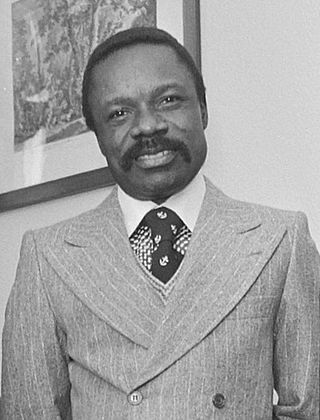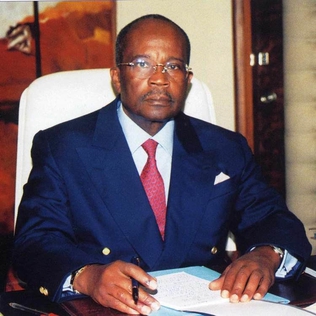 |
|---|
The Association for Socialism in Gabon (French : Association pour le socialisme au Gabon, APSG) was a political party in Gabon.
 |
|---|
The Association for Socialism in Gabon (French : Association pour le socialisme au Gabon, APSG) was a political party in Gabon.
After the restoration of multi-party democracy, the party won six seats in the 1990 parliamentary elections. [1] It supported President Omar Bongo of the Gabonese Democratic Party in the 1993 presidential elections. [2]

Gabon, officially the Gabonese Republic, is a country on the Atlantic coast of Central Africa, on the equator, bordered by Equatorial Guinea to the northwest, Cameroon to the north, the Republic of the Congo on the east and south, and the Gulf of Guinea to the west. It has an area of 270,000 square kilometres (100,000 sq mi) and a population of 2.3 million people. There are coastal plains, mountains, and a savanna in the east. Libreville is the country's capital and largest city.
Little is known of the history of Gabon before European contact. Bantu migrants settled the area beginning in the 14th century. Portuguese explorers and traders arrived in the area in the late 15th century. The coast subsequently became a centre of the transatlantic slave trade with European slave traders arriving to the region in the 16th century. In 1839 and 1841, France established a protectorate over the coast. In 1849, captives released from a captured slave ship founded Libreville. In 1862–1887, France expanded its control including the interior of the state, and took full sovereignty. In 1910 Gabon became part of French Equatorial Africa and in 1960, Gabon became independent.

The politics of Gabon takes place in a framework of a republic whereby the president of Gabon is head of state and in effect, also the head of government, since he appoints the prime minister and his cabinet. The government is divided into three branches: the executive headed by the prime minister, the legislative that is formed by the two chambers of parliament, and the judicial branch. The judicial branch is technically independent and equal to the two other branches, although in practice, since its judges are appointed by the president, it is beholden to the same president. Since independence the party system is dominated by the conservative Gabonese Democratic Party.

Omar Bongo Ondimba was a Gabonese politician who was the second president of Gabon for almost 42 years, from 1967 until his death in 2009. Bongo was promoted to key positions as a young official under Gabon's first President Léon M'ba in the 1960s, before being elected vice-president in his own right in 1966. In 1967, he succeeded M'ba to become the country's second president, upon the latter's death.

The Gabonese Democratic Party is a political party in Gabon. It was the dominant political party in Gabonese politics from 1961 until 2023, when it was deposed in a coup d'état against President Ali Bongo Ondimba. It was also the sole legal party between 1968 and 1990.

Gabriel Léon M'ba was a Gabonese politician who served as both the first Prime Minister (1959–1961) and President (1961–1967) of Gabon.

The National Woodcutters Rally–Rally for Gabon is a political party in Gabon.

The Gabonese Progress Party is a political party in Gabon.

The Democratic and Republican Alliance is a political party in Gabon.

Casimir Marie Ange Oyé-Mba was a Gabonese politician. After serving as Governor of the Bank of Central African States (BEAC) from 1978 to 1990, Oyé-Mba was Prime Minister of Gabon from 3 May 1990 to 2 November 1994. Subsequently, he remained in the government as Minister of State for Foreign Affairs from 1994 to 1999, Minister of State for Planning from 1999 to 2007, and Minister of State for Mines and Oil from 2007 to 2009.

The Senate (Sénat) is the upper house of the Parliament of Gabon. It has 67 members, elected in single-seat constituencies by local and départemental councillors or appointed by the president for a six-year term. Beginning with the 2009 election, some constituencies elect two senators.

The National Assembly is the lower house of the Parliament of Gabon. It has 143 members, elected by Two round system

Parliamentary elections were held in Gabon on 17 December 2006, although voting in seven seats took places on 24 December 2006 due to logistical problems. The ruling Gabonese Democratic Party (PDG) won 82 seats, with other parties that supported President Omar Bongo winning another seventeen seats, among them the National Woodcutters' Rally of Paul M'ba Abessole with seven seats, the Democratic and Republican Alliance with three seats, the Circle of Reformist Liberals with two seats and the Social Democratic Party with one seat.

The African Forum for Reconstruction is a political party in Gabon led by Léon Mbou Yembi.

Presidential elections were held in Gabon on 5 December 1993, the first time more than one candidate had contested a presidential election in the country. Incumbent President Omar Bongo, in power since 1967, sought a five-year term against twelve other candidates. According to official results Bongo won in the first round with 51.2% of the vote. However, the main opposition leader, Paul Mba Abessole, alleged fraud, claimed victory, and threatened to form a rival government. Riots in 1994 practically brought the country to a standstill until Bongo agreed to attend a peace conference with opposition groups in September 1994, in which a coalition government was formed until the 1996 parliamentary election, which Bongo's Gabonese Democratic Party won by a landslide.
Jules-Aristide Bourdes-Ogouliguende was a Gabonese politician who was the President of the Congress for Democracy and Justice (CDJ), an opposition party. He served as a minister in the government of Gabon from 1976 to 1990 and was President of the National Assembly from 1990 to 1993; from 1993 until his death in 2018.

Parliamentary elections were held in Gabon in 1990, the first multi-party elections in the country since 1967. The first round of voting was held on 16 September 1990, with a second round due the following week. However, results from 32 of the 120 constituencies were annulled after public protests claiming fraud by the ruling Gabonese Democratic Party and the second round was postponed. Re-runs were held on 21 October, with a second round on 28 October.

Parliamentary elections were held in Gabon on 17 December 2011. Amidst an opposition boycott, the ruling Gabonese Democratic Party (PDG) won a landslide victory; official results were announced on 21 December 2011, showing that the PDG won 113 out of 120 seats, the most it had won since the beginning of multiparty politics in the early 1990s. A few other parties won the handful of seats remaining: the Rally for Gabon (RPG) won three seats, while the Circle of Liberal Reformers (CLR), the Independent Centre Party (PGCI), Social Democratic Party (PSD), and the Union for the New Republic (UPRN) won a single seat each.
The Gabonese Socialist Union is a political party in Gabon. Initially an opposition party founded by formerly exiled student activists, the party aligned itself with the ruling majority.

The Circle for Renewal and Progress was a political party in Gabon.